Prussia
Prussia
See also: European history
Prussia (Preußen) was a feudal state, later a kingdom and finally a republic in central Europe, existing from early modern times to 1945. Its centre was in the northeast of present-day Germany, but at the height of its power it also controlled most of Germany's northern half, vast parts of today's Poland, and—at least temporarily—bits of what now is Denmark, Russia, Lithuania, the Czech Republic, Switzerland and Belgium.
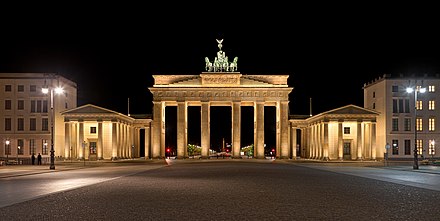 Initially just one of the many states of the Holy Roman Empire, Prussia rose to become one of Europe's great powers during the 17th and 18th centuries. The Prussian troops' drill and discipline was almost proverbial and its army won a series of sensational victories against sometimes far superior enemy troops. Prussian art of war therefore arouses the interest of amateurs of military history up to the present day.
Initially just one of the many states of the Holy Roman Empire, Prussia rose to become one of Europe's great powers during the 17th and 18th centuries. The Prussian troops' drill and discipline was almost proverbial and its army won a series of sensational victories against sometimes far superior enemy troops. Prussian art of war therefore arouses the interest of amateurs of military history up to the present day.
It should not be forgotten, however, that Prussia was also a cultural centre, of which beautiful palaces and gardens stand witness as well as many artworks created by Prussian subjects who enjoyed the patronage of their rulers.
Understand
 Prussia, or more accurately Brandenburg-Prussia, emerged from the union of two formerly unrelated territories: the Margraviate of Brandenburg (roughly equivalent to today's German states of Brandenburg and Berlin) and Prussia proper that was more than 500 km further northeast on the Baltic Sea (later known as East Prussia, today the Russian Kaliningrad Oblast and northeastern Poland). They were united in 1618 under the crown of the Hohenzollern dynasty.
Prussia, or more accurately Brandenburg-Prussia, emerged from the union of two formerly unrelated territories: the Margraviate of Brandenburg (roughly equivalent to today's German states of Brandenburg and Berlin) and Prussia proper that was more than 500 km further northeast on the Baltic Sea (later known as East Prussia, today the Russian Kaliningrad Oblast and northeastern Poland). They were united in 1618 under the crown of the Hohenzollern dynasty.
Origins
See also: Franks
The Margraviate of Brandenburg, centered around the cathedral city Brandenburg an der Havel was created in the 10th century when the area was conquered from pagan Slavs and successively colonised by Christian, German-speaking settlers. The House of Hohenzollern whose ancestral seat was actually hundreds of miles further southwest in the Swabian Mountains and who also possessed territories in Franconia (Burgraviate of Nuremberg), were enfeoffed with the Margraviate of Brandenburg in 1415. They moved the capital from Brandenburg-City to Berlin. Due to its infertile soils and lack of natural resources, the land was ridiculed as "the sandbox of the Holy Roman Empire". Despite its relatively small population and economic insignificance, the Margraves of Brandenburg were, for dynastic reasons, among the seven lords who had the right to elect the Roman-German kings.
Prussia proper was ruled by the Order of Teutonic Knights from the 13th century. They created a Christian, German-dominated state, centered on Malbork and later Königsberg. While Western Prussia got under Polish rule in 1454, Eastern Prussia was secularised in the course of the Protestant Reformation 1525, henceforth ruled by a different line of the Hohenzollern dynasty.
Both lines were united by marriage in 1594. Having multiplied its territories, Brandenburg-Prussia was awarded further dominions in Westphalia, Pomerania and today's Saxony-Anhalt at the end of the Thirty Years' War (1648), Elector Frederick William modernised the state in the mid-17th century. He invited Protestant refugees from France (Huguenots) and Dutch settlers who introduced modern trades and technologies, contributing to an economic boom. Frederick William therefore went down in history as the "Great Elector" (Großer Kurfürst).
Golden Era
_-_Google_Art_Project.jpg/440px-Friedrich_der_Gro%C3%9Fe_(1781_or_1786)_-_Google_Art_Project.jpg)
 Frederick III of Brandenburg crowned himself King Frederick I in Prussia in 1701 (avoiding the title "King of Prussia" in order not to provoke the king of Poland or the Emperor). His son, Frederick William I, reformed military training, tactics and conscription. His frugal, disciplined, military lifestyle earned him the nickname of "Soldier-King". However, he never started a war and his rule was one of the most peaceful in the Prussian history.
Frederick III of Brandenburg crowned himself King Frederick I in Prussia in 1701 (avoiding the title "King of Prussia" in order not to provoke the king of Poland or the Emperor). His son, Frederick William I, reformed military training, tactics and conscription. His frugal, disciplined, military lifestyle earned him the nickname of "Soldier-King". However, he never started a war and his rule was one of the most peaceful in the Prussian history.
His son Frederick II (r. 1740–1786) was the most famous and admired Prussian ruler, usually called Frederick the Great. Unlike his father, he was more interested in music and philosophy and hated military training. He became one of the most exemplary rulers of "enlightened absolutism", corresponding with important philosophers and writers of his time, reforming school and judicial systems. Despite his earlier aversion to the military, Frederick came to lead Prussia into a series of wars, sometimes against enemies whose population and troops outnumbered the Prussians by far, taking existential risks for his state. However, thanks to its troops' superior drill, discipline and armament (and in some cases luck), the Prussian army came to be known as the most formidable in Europe. Prussia won the Silesian Wars against Austria (1740–45) and the Seven Years' War (1756–63, known as the French and Indian War in North America) against France, Austria and Russia. Since that time, Prussia played in the concert of European great powers.
Merging into the German nation-state
During the decades following the French Revolution and Napoleonic Wars, Prussia and Austria competed for the leading role within the German Confederation. During the Revolutions of 1848, the National Assembly offered the imperial German crown to Prussian King Frederick William IV which he rejected as a "crown from the gutter". Afterwards, Prussian troops were instrumental in subduing the revolution, not only in Prussia but also in other German states. Prussia was a center of industrialisation during the mid-19th century. Most parts of the kingdom were connected with the rail network during the 1850s and 1860s.
After winning a war against Austria and another against France, the German Empire was founded—without Austria—in 1871. The Prussian King William was crowned German Emperor and the Prussian prime minister Otto von Bismarck became chancellor of the German Empire. Thanks to French war reparations as well as a booming industry and trade, Prussia (and Germany in general) prospered during the following decades that are called the Gründerzeit ("era of founders") or Wilhelmine era. Its cities grew rapidly; official and private buildings as well as whole quarters were built in an eclectic and historicist style that often took inspiration from medieval architecture (Romanesque and Gothic revival). Housing from this era is now among the most sought after real estate in Germany and often found in gentrifying neighborhoods. The German Empire would grow into the world's third largest colonial empire after the British and French colonial empires, remaining so until its defeat in World War I.
After the German revolution of 1918, Prussia continued to exist as a republic (or "Free State") within the Weimar Republic. It was steadily ruled by a coalition of social democrats and liberals until 1932 when the Reich government imposed direct rule, thereby breaking the constitution, a few months before the Nazis took power. Hitler's regime superficially glorified Prussian traditions (mainly the military ones), but did nothing to restore or maintain Prussia's autonomous institutions. The Allies of World War II viewed Prussia as the origin of German militarism and aggression and dissolved Prussia once and for all after their victory in 1945. Each of the 16 states of today's Germany has at least a bit of former Prussian possessions.
Culture
.jpg/440px-Immanuel_Kant_(painted_portrait).jpg) Three of the most famous German philosophers came from Prussia. Immanuel Kant (1724–1804; "Critique of Pure Reason") was born in East Prussian Königsberg and spent most of his life there. Karl Marx was born and raised in Trier, studied at the Prussian universities of Bonn and Berlin and worked in Cologne during the 1848/49 revolution, but was expatriated and deported from Prussia after the revolution failed. Friedrich Nietzsche (1844–1900) was born near Lützen, raised in Naumburg and studied in Bonn, but later moved to Switzerland and renounced his Prussian citizenship. Max Weber (1864–1920), one of the fathers of sociology, came from Erfurt and studied in Berlin, his works (e.g. "The Protestant Ethic and the Spirit of Capitalism") have a well-known bias towards Prussian-Protestant rationalism.
Three of the most famous German philosophers came from Prussia. Immanuel Kant (1724–1804; "Critique of Pure Reason") was born in East Prussian Königsberg and spent most of his life there. Karl Marx was born and raised in Trier, studied at the Prussian universities of Bonn and Berlin and worked in Cologne during the 1848/49 revolution, but was expatriated and deported from Prussia after the revolution failed. Friedrich Nietzsche (1844–1900) was born near Lützen, raised in Naumburg and studied in Bonn, but later moved to Switzerland and renounced his Prussian citizenship. Max Weber (1864–1920), one of the fathers of sociology, came from Erfurt and studied in Berlin, his works (e.g. "The Protestant Ethic and the Spirit of Capitalism") have a well-known bias towards Prussian-Protestant rationalism.
Alexander von Humboldt (1769–1859)—polymath, geographer, naturalist and explorer—was a Prussian aristocrat from Berlin. His brother Wilhelm (1767–1835) who was more interested in linguistics, philosophy and arts, reformed the Prussian education system, founded the University of Berlin and shaped the "Humboldtian education ideal".
The classical German poets (around 1800) like Goethe, Schiller and Hölderlin lived in the small and medium-sized states of central and southern Germany, with the notable exception of playwright Heinrich von Kleist (1777–1811) who was a Prussian to the core, coming from Frankfurt an der Oder and serving as a lieutenant in the Prussian army. During the following decades however Prussia was the heartland of German romantic literature. Circles of poets and intellectuals convened in Berlin's literary salons. Among the most notable authors are E. T. A. Hoffmann (1776–1822; "The Nutcracker and the Mouse King"), Joseph von Eichendorff (1788–1857; who earned his bread-and-butter as a Prussian administrator) and Heinrich Heine (1797–1856; emigrated to France, his works being banned in Prussia). The brothers Jacob and Wilhelm Grimm, collectors of world-famous fairytales ("Cinderella", "Rumpelstiltskin", "Snow White") came from Hesse, but spent the two last decades of their lives in Berlin at invitation of the "romanticist on the throne", King Frederick William IV. Realist writer Theodor Fontane (1819–1898; "Effi Briest") may be the most Prussian of authors, his five-volume travelogue Wanderungen durch die Mark Brandenburg ("Rambles in Brandenburg") is a literary monument to his homeland's countryside.
 Composer George Frideric Handel (1685–1759) was born in Halle which then belonged to Brandenburg-Prussia, but spent most of his adult life in London, eventually becoming a British subject. Johann Sebastian Bach dedicated his Brandenburg Concertos to the Margrave of Brandenburg-Schwedt who belonged to a branch line of the Prussian dynasty. King Frederick the Great is known for having played the flute and composed a number of pieces himself. Apart from that, Prussia did not play a great role in music until the 19th century. Among the Romantic composers with strong biographic links to Prussia are Felix Mendelssohn (1809–1847), Robert Schumann (1810–1856) and Richard Strauss (1864–1949). The Berlin Philharmonic was founded in 1882 and has become one of the world's leading symphony orchestras.
Composer George Frideric Handel (1685–1759) was born in Halle which then belonged to Brandenburg-Prussia, but spent most of his adult life in London, eventually becoming a British subject. Johann Sebastian Bach dedicated his Brandenburg Concertos to the Margrave of Brandenburg-Schwedt who belonged to a branch line of the Prussian dynasty. King Frederick the Great is known for having played the flute and composed a number of pieces himself. Apart from that, Prussia did not play a great role in music until the 19th century. Among the Romantic composers with strong biographic links to Prussia are Felix Mendelssohn (1809–1847), Robert Schumann (1810–1856) and Richard Strauss (1864–1949). The Berlin Philharmonic was founded in 1882 and has become one of the world's leading symphony orchestras.
When it comes to architecture, the typical style of the era of Frederick the Great is called "Frederician Rococo", his most notable architect being Georg Wenzeslaus von Knobelsdorff (1699–1735). A century later, Karl Friedrich Schinkel (1781–1841) is associated with the Neoclassical style representing the height of Prussia's power like no other. He put his lasting mark on Berlin's cityscape by designing Altes Museum (Old Museum), Neue Wache (New Guardhouse), Konzerthaus (Concert Hall) and Bauakademie (Building Academy), Charlottenhof and Babelsberg Palaces in Potsdam, as well as numerous churches, palaces and official buildings in the kingdom's provinces. The great Romantic painter Caspar David Friedrich (1774–1840) came from Greifswald in the Prussian province of Pomerania.
Destinations
Germany
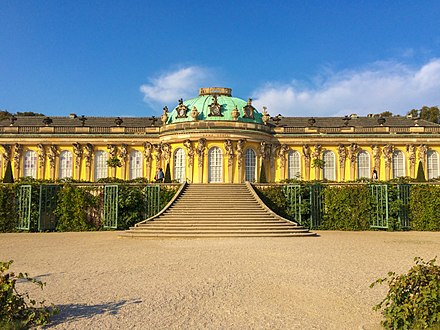
- Brandenburg an der Havel, 52.41°, 12.56°. Considered the cradle of Brandenburg-Prussia, Brandenburg was the first among the cities and its cathedral the "mother" of all churches of the state. It served as the capital of the Margraviate of Brandenburg until 1415 when it was replaced by Berlin. Old town with numerous medieval brick buildings, churches and cathedral.
- Berlin, 52.52°, 13.38°. Capital of Brandenburg/Prussia from 1415 until its dissolution in 1945. The city is linked with Prussian history like no other. The Hohenzollern's Baroque city palace is being rebuilt to house the Humboldt Forum museum collection. It is to be opened to the public in autumn 2020. Prussian kings are buried in a vault below the Berlin cathedral. The Brandenburg Gate is a triumphal arch to commemorate Prussian victories. The Museum Island showcases artworks and antiquities collected by the Prussian rulers and state. Märkisches Museum is dedicated to the history of the Margraviate of Brandenburg (one of the predecessors of Prussia and later its central province). Glienicke Palace and the park on Pfaueninsel (peacock island) in the far southwest of Berlin are part of the UNESCO World Heritage.
- Potsdam, 52.4°, 13.07°. Like other European rulers (think France's Louis XIV and Versailles), Frederick the Great preferred to move his residence outside the actual capital, creating a unique landscape of Baroque palaces and gardens in and around Potsdam. It includes Sanssouci summer palace and gardens, New Palace, the City Palace (rebuilt in 2013), Babelsberg Palace and Cecilienhof. The latter was the venue of the Potsdam Conference of the victors of World War II in 1945, where the final dissolution of Prussia was determined.
- Neuruppin, 52.925°, 12.805°. Sometimes quoted as the "most Prussian of all Prussian towns". It was one of the first garrisons in Brandenburg, its infantry regiment commanded by Frederick the Great when he was still crown prince. Two of the most famous Prussian artists—architect Karl Friedrich Schinkel and writer Theodor Fontane—were born in Neuruppin.
- Rheinsberg Palace. Frederick the Great's residence during his time as crown prince. The water castle was completely redesigned after Frederick's wishes and is considered the first work of "Friderician Rococo", model for the later palaces of this era. Frederick remembered his years in Rheinsberg as the happiest time of his life.
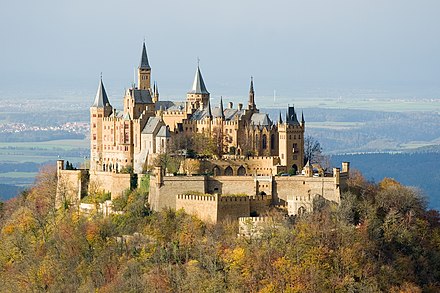
- Hohenzollern Castle, Bisingen (near Hechingen, Swabian Mountains). Ancestral seat of Prussia's ruling dynasty. The original medieval castle was replaced by a romantic fairytale castle under Frederick William IV in the second half of the 19th century.
- Bayreuth, 49.94°, 11.58°. Until 1791, the Margraviate of Brandenburg-Bayreuth was not an actual part of Prussia, but ruled by a different branch of the Hohenzollern dynasty. There were however close relations between the ruling houses: for example, Frederick the Great's sister Wilhelmine married the ruler of Bayreuth. She initiated the Margravial Opera House, now part of the UNESCO World Heritage. The petty state also provided troops for Prussia's wars, the dragoons of Bayreuth and Ansbach are praised in the Hohenfriedberger, one of the most famous Prussian military marches (purportedly composed by Frederick the Great himself).
- Ansbach, 49.3°, 10.575°. A very similar case to Bayreuth, the Margraviate of Brandenburg-Ansbach was legally independent, but had the same ruler for much of its history. Magnificent Baroque residence and court garden.
- Usedom, 53.96°, 14.16°. When Prussia's imperial family and other members of the aristocracy wanted to go to the seaside, they usually travelled to the Baltic sea spas of Heringsdorf, Ahlbeck or Bansin on the island of Usedom. Thus, these places earned their bynames of "imperial spas". Many posh resorts from the late 19th and early 20th century have survived and have been restored.
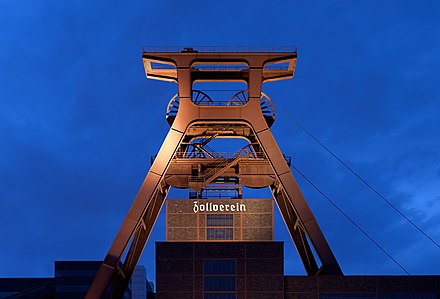
- Ruhr, 51.45°, 7.47°. Some cities of the Ruhr area belonged to Brandenburg-Prussia since the 16th century, others were added in 1815. The coal-mining and steel-producing conurbation became Prussia's industrial powerhouse and a main source of its prosperity during the 19th century. Football club names like Borussia Dortmund (Borussia being the Latin name of Prussia) reflect the population's identification with the kingdom.
- Cologne, 50.94°, 6.96°. Köln was a free imperial city until it became part of Prussia in 1815. It was the second-most populous city of Prussia during the 19th and early 20th century. The Catholic population with its strong local and regional identity could hardly identify with the Protestant-majority state and considered themselves "forced Prussians". The larger-than-life equestrian statues of the four last Prussian kings next to the Hohenzollern bridge were therefore hated by some as symbols of foreign rule.

- Koblenz, 50.36°, 7.61°. The city came to be Prussian in the same year as Cologne, its population being Catholic as well and speaking a similar dialect. But dominated by military garrisons and administration (Koblenz was made capital of the Rhine Province rather than the much bigger Cologne), it felt a lot easier with its new Prussian identity. The enormous equestrian statue of William I at the confluence of Rhine and Moselle is a prime symbol of Prusso-German imperialism.
- Wilhelmshaven, 53.52°, 8.11°. Prussia acquired this place on the Jade Bay by contract from the Grand Duchy of Oldenburg in 1853. It was developed into the Prussian Navy's main base on the North Sea and named after King William I. Numerous places within the town are named after Hohenzollern rulers, including the Kaiser Wilhelm Bridge (a 159-metre long steel framework swing bridge), the Friedrich Wilhelm Square and the monument to William I.
- Museum of Military History, Dresden. Dresden was never part of Prussia, but the capital of Saxony, a separate state that narrowly escaped its annexation by Prussia in 1815 and 1866. Given that Prussia was Germany's prime military power, however, considerable parts of the exhibition are dedicated to Prussian military history.
- Site of the Battle of Jena, 50.9496°, 11.5733°. Decisive Prussian defeat against Napoleon's France during the War of the Fourth Coalition (1806). It is marked by Napoleon's Stone and sometimes sees historical reenactment by military history nerds. Jena never belonged to Prussia, but to the petty Duchy of Saxe-Weimar.
Poland
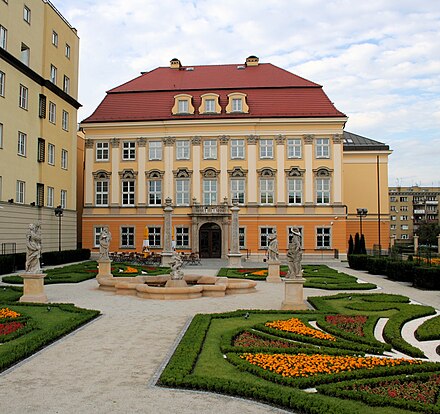
- Szczecin, 53.43°, 14.53°. Stettin was Prussia's main port on the Baltic Sea and capital of the province of Pomerania, after being conquered from Sweden in 1713. The city features numerous Baroque and historicist buildings from the Prussian era.
- Kołobrzeg, 54.17°, 15.57°. Kolberg was a Prussian fortress, its defense against a French siege in 1807 was one of the few Prussian successes during the Napoleonic wars (and later glorified in a Nazi propaganda film). The town was heavily damaged during World War II, but the Prussian-era town hall and a few other historic buildings still exist.
- Wrocław, 51.07°, 17.02°. Breslau was the capital of Silesia which was conquered by Prussia in 1742. The Prussian kings had a residence there, where Frederick William III called on his people to fight against Napoleon and endowed the Iron Cross as a decoration for the liberation fighters. The monumental Century Hall of 1913, featuring one of the biggest domes in the world at the time of its completion, commemorates the successful war against Napoleon.
- Jelenia Góra, 50.9°, 15.74°. The Hirschberg valley, surrounded by the foothills of the Karkonosze mountains, was the favourite summer retreat of the Prussian aristocracy during the early- and mid-19th century. King Frederick William III, his brother Prince William, some Prussian generals and high-ranking officials had their secondary residences in the area, of which a number of beautiful palaces, manors and gardens stand witness.
- Poznań, 52.4°, 16.92°. The Polish city was conquered by Prussia in 1793. The 19th-century quarter around Plac Wolności (formerly Wilhelmsplatz) reflects a similar architectural style as many formerly Prussian cities. The extensive Poznań Fortress was created under Prussian rule in the 19th and early 20th centuries. The Imperial Castle, started under William II in 1905 is one of the latest major palace buildings in Europe.
- Gdańsk, 54.348056°, 18.655°. Polish port city, annexed by Prussia in 1793. It known as Danzig during the time of Prussian and later, German rule. Following Germany's defeat in World War II, the city was returned to Poland, during which it was ethnically cleansed of its German population, who were replaced with ethnic Poles.
- Monument to the Battle of Leuthen, Lutynia, Środa Śląska (20 km west of Wroclaw). Prussian victory during the Seven Years' War (1757). The Victory statue was removed after 1945, the pedestal with inscription remains.
Belgium
- Waterloo Battlefield, Waterloo. Prussian troops contributed substantially to the final Allied victory over Napoleon. The Duke of Wellington famously prayed for "Night or the Prussians must come" (alternatively quoted as "Give me night or give me Blücher", referring to the Prussian commander)—and they came.
Czech Republic
- Site of the Battle of Königgrätz, Sadová (15 km northwest of Hradec Králové), 50.2972°, 15.7403°. Decisive Prussian victory over Austria in the German Fraternal War (1866) led to the exclusion of Austria from Germany and creation of a Prussian-dominated German Empire.
Denmark
- Dybbøl Banke, Sønderborg. Site of the Prussian victory over Denmark in 1864. Marked by a well-designed history center with faithful replica of the Danish defence works and guides in original uniforms.
Russia
- Kaliningrad, 54.72°, 20.52°. Königsberg was the capital of East Prussia. Here is where Frederick III of Brandenburg first crowned himself King "in" Prussia in 1701. However, Königsberg was almost totally destroyed during World War II and rebuilt with a completely new outline during Soviet rule, so expect to find few attractions from the Prussian era.
Ghana
- Fort Groß Friedrichsburg (Groot Fredericksborg), Princes Town (40 km east of Axim). Ruins of a Brandenburgian fort on the "Gold Coast" built in 1683. It was a central base for the European slave trade. From 1682 to 1720, the Brandenburg Gold Coast was Brandenburg-Prussia's colonial possession in Africa. It was then sold to the Dutch Republic. The place is part of the UNESCO World Heritage entry of Forts and Castles along the Ghanaian coast.